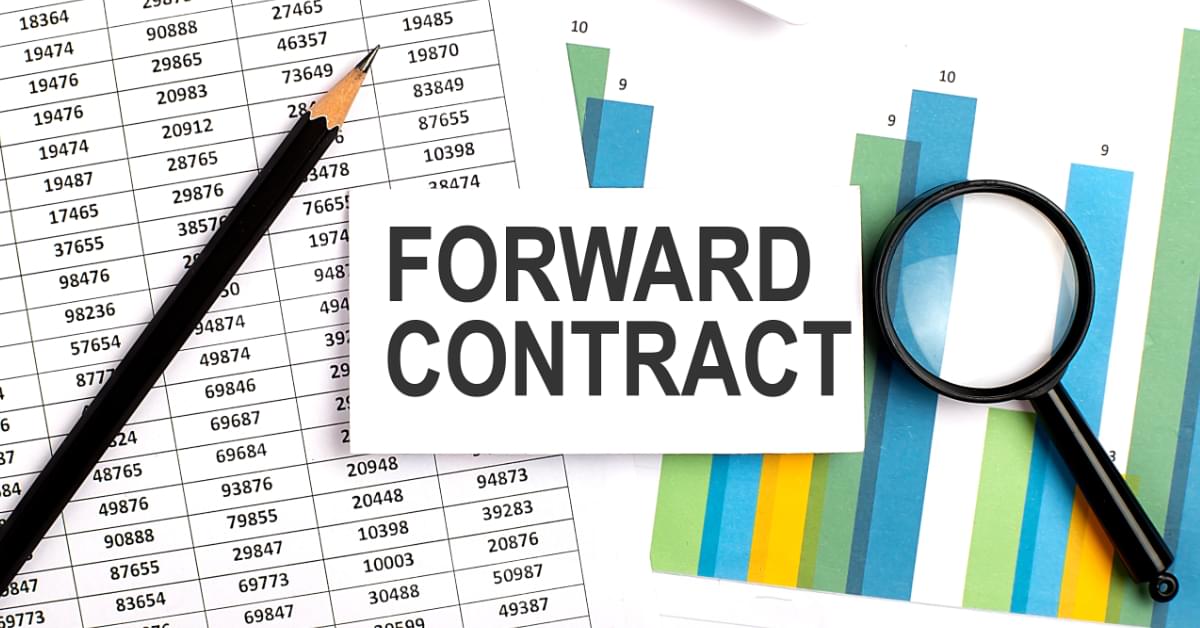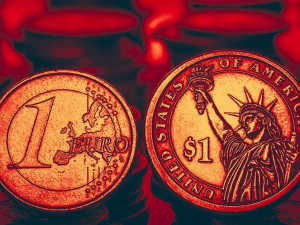
Forward contracts are a way for businesses to mitigate risks and enhance financial stability in trading. Currency fluctuations and commodity price volatility can be an issue for businesses, particularly if they are trading overseas. Using a forward contract is a way to ensure that you are paying a fixed price and that you prevent any unnecessary losses through currency or commodity price fluctuations.

What is a forward contract?
A forward contract is simply an agreement between a buyer and a seller to make a transaction at a future date at a fixed price. This can be any kind of asset, such as a commodity, currency, or financial instrument. This price fixture means that the currency exchange rate is agreed upon and fixed so that changes in the currency’s exchange rate do not affect the deal. This is how a forward contract works in its most basic form.
Due to the fluctuation of currencies against each other, international deals can be heavily affected.
For example, if you decided to make a deal with someone in the US and you were in the UK, your trade would have to take into account the shift in currency values. Otherwise, if there is a change in the exchange rate of the currency midway through the deal, you could find out that you had made a loss or your client has ended up paying more. Combined with commodity price fluctuations, this can be a significant difference.
The GBP/USD exchange rate is constantly changing, so it’s crucial that the exchange rate is factored in when making an international trade. This is where a forward contract comes in.
Example scenario
To demonstrate how a forward contract might work in action with currency, here is an example scenario.
Company A in the US wants to purchase raw materials from Company B in the UK over a three-month period. The company relies on a stable supply of these materials in order for the business to run smoothly and relies on profits from the materials in order to maintain profits.
A shift in the price between the USD and GBP could be hugely damaging for the company if USD depreciates against GBP, as they are converting USD to purchase the raw materials in GBP.
Therefore, Company A enters into a forward contract with Company B.
1. Current exchange rate
The exchange rate is 1 USD to 0.75 GBP at the time of the deal. This means that the USD is worth less than GBP. The exchange rate must be taken into account when finding a price for the materials in the UK.
2. Purchasing the materials
Company A decides that it wants to purchase £1,000,000 worth of raw materials from Company B. The exchange rate of 1 USD = 0.75 GBP means that the purchase will cost Company A roughly $1,333,333. This might be affordable for the company at the time, but in three months, there is a chance that the USD could drop in value.
Imagine if there is an economic downturn at that time, and the USD drops to a value of 1 USD = 0.60 GBP. The price for the materials would then be closer to $1,666,666 – an increase of $333,333.
If there were no forward contract in place, then Company A would have to go ahead with the purchase regardless of the exchange rate and potentially pay more than initially budgeted.
3. Using a forward contract
To hedge against this potential loss, Company A decides to enter into a forward contract with Company B. They both agree to set the transaction at a fixed exchange rate of 1 USD = 0.75 GBP. This means that regardless of the exchange rate throughout the three months, the deal will always go through at this exchange rate, and Company A is guaranteed to pay $1,333,333 for the raw materials. A forward contract is normally done using a third-party financial institution.
Using a forward contract is very common, and most business trading overseas will enter into some form of forward contract. It allows companies to better predict their budgets and to plan their finances more effectively. While they might miss out on a potential discount if their home currency appreciates, they also remove the risk of it plummeting and having to pay significantly more.
Types of forward contract
The type of forward contract described in the above example is an incredibly simplified version, and in reality, forward contracts come in many different forms to cater to many different markets and businesses. Some forwards are also used for international business, but others are for trading strategies.
Forward contracts can come as:
- Commodity forwards
- Currency forwards
- Interest rate forwards
- Equity forwards
- Index forwards
- Property forwards
- Weather forwards
- Credit default forwards
- Freight forwards
- Window forwards
- Long-dated forwards
- Non-deliverable forwards (NDFs)
- Flexible forwards
- Closed outright forwards
- Fixed-date forwards
- Option forwards
Some notable examples from this list demonstrate the variations between forward contracts and how they can be adapted to any kind of business deal.
Window forwards
Window forwards work by providing a period in which the contract can be fulfilled, rather than a fixed price at a fixed date. This means that those within the contract can wait until they are ready to fulfil the contract at an exchange rate that works for them. This can work well with transactions where an end date is not certain.
Long-dated forwards
A lot of forwards are within a 12-month period, but long-dated forwards have a maturity date of up to 10 years. These are often used in huge projects, which can take years to complete, and require security over a long period of time.
Weather forwards
Weather forwards work by using weather derivates. Weather derivates are financial instruments that work to make weather observations and, as a result, determine whether industries based on the observations will suffer or benefit. For example, low rainfall affects a hydro-generation business, and agricultural companies are affected by drought.
These forwards will ensure that deals can be hedged against adverse weather conditions.

Forward contracts with CurrencyTransfer
Forward contracts are a way to provide price certainty, mitigate risk, and also allow for financial stability in international businesses. Profit margins can be protected, and international trade can remain stable.
If you’re interested in using forward contracts for your business, or would simply like to learn more, then take a look at our forward contracts service. CurrencyTransfer will also help you find competitive exchange rates with world-class support for your business matters.
Caleb Hinton
Caleb is a writer specialising in financial copy. He has a background in copywriting, banking, digital wallets, and SEO – and enjoys writing in his spare time too, as well as language learning, chess and investing.



